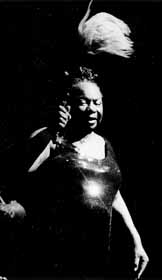Raoul Hernadez
The Austin Chronicle, 3 November 2000
 It was a remarkable show for a number of reasons. It was remarkable, first off, that the University of Texas' Performing Arts Center had managed to lure the reclusive Nina Simone to Austin for its 2000-01 season, the legendary vocalist and civil rights activist having made her home in France for the past 25 years. Remarkable that the Bass Concert Hall was one stop in a grand total of only four here in the states and that the long-booked date had finally arrived. The palpable excitement generated by the sold-out throng was also remarkable, crackling and buzzing like an electrical storm out on the hall's front steps and in the lobby before the show.
It was a remarkable show for a number of reasons. It was remarkable, first off, that the University of Texas' Performing Arts Center had managed to lure the reclusive Nina Simone to Austin for its 2000-01 season, the legendary vocalist and civil rights activist having made her home in France for the past 25 years. Remarkable that the Bass Concert Hall was one stop in a grand total of only four here in the states and that the long-booked date had finally arrived. The palpable excitement generated by the sold-out throng was also remarkable, crackling and buzzing like an electrical storm out on the hall's front steps and in the lobby before the show.
It was remarkable when the 67-year-old diva was led out onstage at precisely 8:15pm. There was Nina Simone. Most of all, it was remarkable how awful her performance was. Introduced as "The High Priestess of Soul, Dr. Nina Simone," she fronted a five-piece backing band (drums, acoustic bass, electric guitar, synthetic keys, and congas), leading them on the black grand piano stage left. Looking none too steady as she was helped to her seat, the adiposed Simone, bursting at the seams of her sequined black dress, sat and tapped out a few keys on her instrument, seeing if she was, as Duke Ellington was fond of remarking, in tune with the piano. "I will be singing some songs from my ancestors," drawled the North Carolina native, drawing the last word out "awwn-cess-stores." Dedicating the set to such civil rights leaders as Marcus Garvey, Huey Newton, and Paul Robeson, Simone burst into a spiritual rave-up that could only be described as cringing.
Out of tune, out of key, out of time, Simone was just plain out of voice, her band every bit up to the task. If this had been a Harlem rent party, Simone would have gone homeless. One could feel the quiet, stunned horror of many in the stately concert hall. Nevertheless, when she finished, stood up, and waved her blond featherduster/flyswatter/tribal wand, patrons who had marked their calendars with this date and were determined not to forget it went wild. This was a "living legend"'s due. A once-proud, stately, mysterious interpreter of all songs -- pop, jazz, blues -- possessed of an erratic recording, and a deep, earthy, impossibly sultry, and unforgettable voice. On this evening, only the pride remained. "You something," she chuckled. After every number she did the same -- stood, took bows, waved her baton in the air -- and after every number the thunderous response was the same. This is where the heart this show lay: in the righteous adulation of one of the most unique stylists of all time.
The Beatles' "Here Comes the Sun" followed, the song's inherent sweetness undermined by the electric piano and Simone's impossibly hoarse voice. Coarse voice. The singer wobbled centerstage, entreating the audience to sing out, but the masses were only slightly less out of key. There were moments when Simone's former glory was blinding, to be sure, her fearless, naked emotionalism and honesty confronting the listener in song, but then inevitably, a sour note would shatter the spell. Like Lionel Hampton being wheeled out on the Austin City Limits soundstage several years ago (an apparent victim of taxidermy), Simone has no business -- from a musical standpoint -- still performing.
"See Line Woman" glowed faintly, the audience clapping along riotously, but the singer's breathing was forced, her mouth dry, and when she sang a cappella, her tongue clicked audibly against the roof of her mouth. Overall, she seemed more than a little disconnected from reality. During the Liberian calypso tune 40 minutes in, Simone abruptly stalked offstage, the bassist and guitarist looking at each other in confusion, continuing a moment longer, then abandoning their posts hastily. The drummer (in instrument only) and conga player took this opportunity to solo weakly, the audience wondering whether the show was over, while many took Simone's exit as a cue to do the same. It was not over, unfortunately, Simone returning and starting the song back up.
A tribute to Martin Luther King Jr. that segued into Peter Tosh's classic "Get Up, Stand Up" and Simone's own "Mississippi Goddamn" ended the set, which at barely over an hour felt, oddly enough, truncated. The last-minute encore snippet, "My Baby Just Cares for Me," prompted the audience to roar like a Roman coliseum. In a hurry to leave and somewhat disoriented, Simone was delayed by the ill-timed presentation of a lithograph from the UT art department. Remarkable. This was Nina Simone.
From The Austin Chronicle